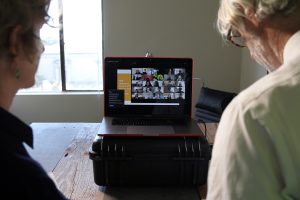
From My Facebook Page Michael Laitman 3/20/20
The coronavirus pandemic we are now experiencing will go down in history as a very unique period. A state of emergency around the world and the paralysis of our economic and social structures have come about all due to one tiny and hardly visible virus.
Other than the coronavirus’ health risks, it endangers the systems that human society was constructed on. It makes no distinction between economic and social status, whether one is a simple worker or a president.
If we thought that we had strong economic and social infrastructures, we quickly saw that a microscopic virus could pull the carpet from under our feet. Countries left, right and center are closing their borders and requesting their citizens to stay at home other than leaving for essential needs.
Therefore, we see how one little virus came along and dismantled the materialistic connections that we created between us, connections based on making money, exploiting and competing with each other.
The Coronavirus: An Example of Human Imbalance with Nature
Nature constantly aspires to restore balance: a state of well-oiled interdependence based on everyone considering the common benefit of all. Our egoistic nature, on the other hand, opposes such mutual consideration, as the human ego strives to use anybody and anything in order to benefit itself.
It follows that we brought about this virus by driving our egoistic connections to unparalleled heights. Consequently, a biological particle surfaced that has the strength to shatter our egoistic connections.
Other than the coronavirus, we encounter countless problems on personal, social, global and ecological scales in the modern world, and it is all due to us trying to build our success on the ruin of others.
In recent times, the human ego passed all limitations. The integral mechanism of nature could no longer bear the soaring levels of exploitation, manipulation and abuse among us humans, and it thus reacted with the coronavirus.
In nature, the human level is its most influential. It affects physical and biological connections on its lower animate, vegetative and still levels. As such, negative human connections give rise to negative feedback toward humans from biological phenomena at lower levels.
However, pandemics are nothing new to our world. We experienced many more deaths in other pandemics of the past, when the ego was much smaller than it is today. We have been though pandemics so relentless that they even discarded with populations of entire cities. Moreover, the coronavirus’ mortality rate is relatively low, and by comparison, the seasonal flu has caused more illnesses and deaths. What, then, is so unique about the coronavirus?
What Is So Unique about the Coronavirus?
The coronavirus’ uniqueness is that, despite the highest level of progress that we have ever achieved in our world, it shows us how we are unable to get our life in order.
With full material well-being, we lack positive human relations. And we can only point the finger of blame on ourselves, or more accurately, on the egoistic human nature involuntarily lurking beneath our every thought and action.
Through the revelation of the coronavirus, nature shows us that we need only cure the ego, i.e., that we need to change our approach to the world from “how can others benefit me?” to “how can I benefit others?” That is the deeper meaning behind the pandemic.
We live in a global and integral world, and the coronavirus pandemic clarifies that our ego-based connections in an interdependent world are faulty and dangerous.
Nature has brought us to the realization of our total dependence on each other. From this realization, we are given time to examine how can we relate to each other and to nature differently, with attitudes of mutual support, encouragement and consideration replacing those of exploitation, manipulation and abuse. If we use the time we have now to impact this shift, we will come out of this pandemic into a new and balanced world, and experience our global interdependence harmoniously.
(Reuters: University of California, Berkeley Professors Lisa Wymore (L) and Greg Niemeyer look at the Zoom screen showing students in their online Collaborative Innovation course in Berkeley, California, U.S., March 12, 2020. REUTERS/Nathan Frandino)


No comments:
Post a Comment